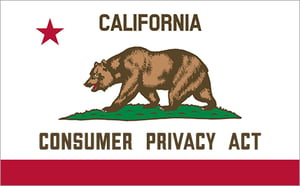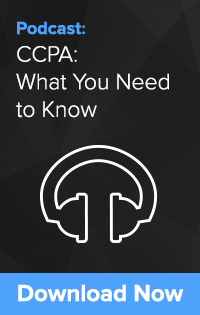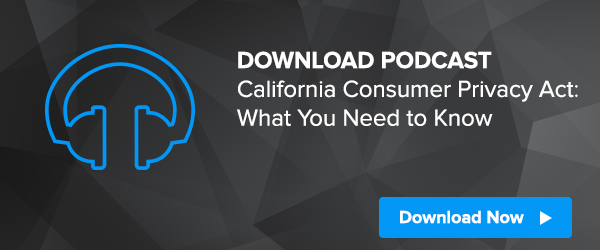 The new California Consumer Privacy Act (CCPA) is a really big deal. Almost no one is ready for it, so you are not alone if you are just getting familiar with the CCPA requirements. Let’s dig into it and try to translate the law (California AB 375 and related statutes) into understandable language. I will also make some recommendations on things you can do right now to get started.
The new California Consumer Privacy Act (CCPA) is a really big deal. Almost no one is ready for it, so you are not alone if you are just getting familiar with the CCPA requirements. Let’s dig into it and try to translate the law (California AB 375 and related statutes) into understandable language. I will also make some recommendations on things you can do right now to get started.
Some history might help
The law itself (AB 375) passed in June of 2018 is a pretty easy read. Interestingly, it directly points to the social and political factors that lead to the creation of the law. The increasing number of data breaches and the Cambridge Analytica scandal are specifically mentioned in the law - but if the law seems a bit rushed and incomplete, that’s because it is!
California is one of those states that make it relatively easy for citizens to gather signatures and put initiatives directly to the people. In early 2018 that is exactly what happened. An initiative related to consumer privacy gathered enough signatures to make it on the California ballot and this proposed new law frightened the technology companies located both in California and outside of the state.
In response to the initiative, the California legislators struck a deal with the initiative proponents. If the legislature could pass a strict new consumer privacy law in short order, the initiative proponents agreed not to put the initiative on the ballot - and that is what happened. Probably breaking speed records for such legislation, the California legislature created the new law in just a few days, and the governor signed it. The initiative was not placed on the ballot.
The speed of the passage of the law had one unfortunate side-effect: There is a lot of ambiguity in the law. You are going to be scratching your head about some of the requirements and definitions in the law. What is missing or undefined is almost as significant as what is in the law. The law goes into effect on January 1, 2020 but the legislature has promised to provide additional guidance in the Fall of 2019, and new clarifying law by June of 2020. More on this below.
The CCPA law, where to find it.
 Reading regulations will usually make your eyes roll back in your head. In this case the California law is a pretty easy read. I highly recommend that you do this. I read several summaries of the law in business and technology journals, but learned some important facts when I subsequently read the law directly. Here is the link (there is a PDF version available for download).
Reading regulations will usually make your eyes roll back in your head. In this case the California law is a pretty easy read. I highly recommend that you do this. I read several summaries of the law in business and technology journals, but learned some important facts when I subsequently read the law directly. Here is the link (there is a PDF version available for download).
Just remember my previous comment about future clarifications of the law. There will be changes and I will try to keep you up to date. You should also check the CCPA website for updates.
Is my Organization required to meet the law?
If you collect data on people who are in California, and meet the minimum criteria (see below), and are not explicitly excluded, you must meet the requirements of the new law. Notice that I did not say “California citizen”, but people who are in the state at the time of data collection. You are not exempt if your organization resides outside of California. If you collect data on people in California, assume you are covered by the law.
If you meet any of these criteria, you are required to meet the new CCPA law:
- You have $25 Million or more in annual revenue
- You collect information on 50,000 or more people
- You derive 50 percent or more of your revenue selling personal information to third parties
The law applies to both public and private organizations. I often hear people tell me that they are not covered by regulations because their company is “private.” Don’t make this mistake. Being a private organization does not exempt you from the new California law.
There are some exclusions in the law: If your organization is already covered by equivalent privacy regulations such as HIPAA, GLBA, and others, you may be exempt. Don’t be fooled into a sense of complacency about this. The CCPA has privacy regulations that are not covered under those laws. If you think you are exempt, I would highly recommend that you get legal advice on this point.
When does it take effect?
The law takes effect on January 1, 2020. Here are some important points to consider:
- The law covers data collected for the previous 12 months (from January 1, 2019).
- There will be clarifying guidance in the Fall of 2019.
- The law is likely to be amended for clarification by June of 2020, but it is not likely to be less restrictive.
- The law covers a much broader set of information than any other regulations, including GDPR.
I’ve heard people say that they are not worried because they meet GDPR requirements. That is a big mistake. There is certainly some overlap with GDPR, but some of the CCPA requirements are different and much broader. For example, what is considered “personal information” includes more and different information than GDPR.
What rights are granted to consumers?
Here is a short list of the rights granted to consumers under the new law (please read the law directly):
- The right to opt-in to data sharing BEFORE you collect and share the information, and the right to opt-out of data sharing at any time. The option to opt-out of data sharing must be respected for 12 months, and subsequently there must be an explicit opt-in process before sharing.
- The right to opt-out of data sharing using a web page or phone number (other methods may be added to these).
- The right to a clear privacy statement on your website that specifically addresses the CCPA.
- The right to know the intended uses of the information that is collected.
- The right to know the categories of information you collect.
- The right to know the specific information you collect.
- The right to know the sources of the information that you collect (websites, third parties, etc.).
- The right to know to whom you sell or share information.
- The right to receive a copy of the information you collect in a user friendly format.
- The right to have you delete their information.
- The right to deletion of their information from any third party service providers with whom you shared the data.
- The right to non-discrimination in terms of your services if they opt-out.
- The individual and class action right to sue if sensitive data is lost and is not encrypted, and for other reasons (please read about encryption below).
You have 45 days to respond to a consumer’s request. With proper notice this can be extended another 45 days (90 days in total).
Try to make a sincere effort to understand the nature and intent of these requirements. The law is written to address those who try to be “cute” about meeting the requirements, and the penalties go way up for intentional avoidance of the requirements.
Note that you have the obligation to verify the identity of the consumer who is exercising these rights. Unfortunately, there is not enough guidance on the proper ways to do this. Be aware, however, that you cannot use any information provided by the consumer that is a part of the privacy request for any other purposes!
What information does it cover?
The personal information covered by the CCPA is quite broad and extends into areas not covered under GDPR and other regulations. The current definition of sensitive consumer data includes:
- Identifiers such as a real name, alias, postal address, unique personal identifier, online identifier IP address, email address, account name, Social Security number, driver’s license number, passport number, or other similar identifiers.
- Personal and commercial behaviors, and inferences from them.
- Characteristics of protected classifications under California or federal law
- Commercial information including records of personal property, products or services purchased, obtained or considered, or other purchasing or consuming histories or tendencies
- Biometric information
- Internet or other electronic network activity information including, but not limited to, browsing history, search history and information regarding a consumer’s interaction with a website, application or advertisement
- Geolocation data
- Audio, electronic, visual, thermal, olfactory or similar information
- Professional or employment-related information
- Education information, defined as information that is not publicly available personally identifiable information (PII) as defined in the Family Educational Rights and Privacy Act (20 U.S.C. section 1232g, 34 C.F.R. Part 99)
- Inferences drawn from any of the information identified in this subdivision to create a profile about a consumer reflecting the consumer’s preferences, characteristics, psychological trends, preferences, predispositions, behavior, attitudes, intelligence, abilities and aptitudes.
This is an amazing list of data items that goes far beyond what we see in other regulations. Many companies have done a lot of work using Artificial Intelligence and Machine Learning to make inferences about consumer behavior. I hope you are not missing the fact that this type of inferential and derived data is covered under the CCPA!
What are the penalties?
The potential penalties fall into two categories: Those imposed by the California Attorney General, and those imposed by newly enabled consumer litigation.
First, let’s look at the penalties that can be assessed by the AG. The penalty range starts at $2,500 per violation. Many people think this amount is for each record that is lost or in non-compliance. It is easy to see that this could expensive very quickly. However, if the AG finds that you are “intentionally” in violation of the CCPA the penalty increases to $7,500 per record. One way to trigger this level of penalty is to ignore a formal notice by the AG that you are in violation of the CCPA. Never ignore this type of notification! The higher level of penalty can trigger an existential crisis for many companies.
The second area of penalty relates to newly enabled litigation by individuals. Under the CCPA individuals have a right to bring direct legal action against an organization. This includes the ability to bring a class action against a company. Other than fully meeting the privacy requirements of the CCPA there is no way to limit your exposure to this type of litigation. The CCPA explicitly prohibits the use of arbitration clauses and other means of contractually reducing your exposure. You have to be notified about an impending action, and you have 30 days to correct the action and respond.
These two areas of exposure should motivate you to get a plan in place to fully meet the CCPA privacy requirements, and start executing on the plan. Time is short.
Am I required to encrypt sensitive data?
If you want to avoid the risk of direct or class action litigation related to data loss you should encrypt the sensitive data. Individual and class action litigation only applies to unencrypted sensitive data that is disclosed or lost, for whatever reason. The CCPA is clear on the need for encryption. If you lose unencrypted sensitive data this is direct evidence that you violated your duty to provide reasonable security procedures and practices to protect the sensitive information. See section 1798.150(a)(1).
Most modern relational and Big Data databases provide an easy path to encryption. Find where your sensitive data is stored, prioritize an encryption strategy, and move it forward. This effort may require an upgrade to your database systems to a version that supports encryption. Understand the budget requirements and add the costs for encryption key management.
What should I do now?
Although there will be additional guidance in late 2019, and there will likely be clarifying legislation in early 2020, you should not wait to get started. There are a lot of things you will need to do to meet the CCPA privacy regulations. Here is a short list that should help you get started. There is more to do, but these will be critical steps:
- Identify and document all of the sensitive information that you collect or derive from interpretations of the data. Document the sources of this data, how you collect it, the individual items, and then classify the data. Pay special attention to the categories of data outlined above. In addition to your internal IT systems be sure to include your hosted and cloud applications, and your web-based SaaS systems.
- Identify all of the third parties with whom you share information. Be sure to document exactly what information is shared.
- Review your website to ensure you meet the explicit requirements of the CCPA. You will need to update your privacy statement per the CCPA requirements.
- Institute processes for handling consumer privacy requests. This will probably require new IT reporting applications as well as human processes for responding to requests. Be sure to keep an audit log of all requests from consumers, and your response.
- For all service providers who receive information that you share, review your service agreements. Revise those agreements to bind the service provider to the new CCPA regulations. If service providers resist new contract terms, or are non-responsive, have a plan to replace those service providers. Since many service contracts renew on an annual basis, start this process now.
- Encrypt the data and use good encryption key management. Your only safe-harbor from litigation in the event of a data loss is encryption. The time to get started is right now.
Disclaimer
Nothing in this article constitutes legal advice in any way. Consult with a qualified attorney for any legal questions or advice. The new California Consumer Privacy Act will have new guidance before the activation date of January 1, 2020 and is likely to be modified by additional legislation. Please refer to the official California state website for more information.

